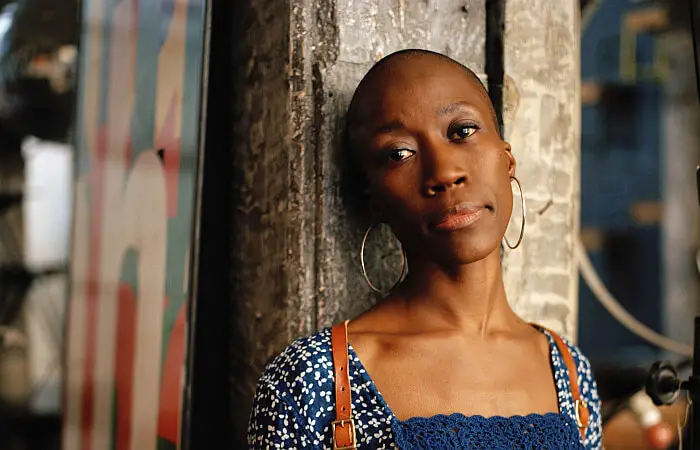Perceptive Travel World Music Reviews
March 2016 - By Graham Reid
In this issue: The spirit of a beleaguered Mali channeled into affecting songs, ancient Armenian music brought into the light, sub-continent music which reaches from the dance-floor to the deities, and Jewish music at the intersection of tradition and Downtown New York.

Ne So
Rokia Traore
We say: One of the great musicians out of Mali sings of her damaged homeland
The recent travails of Mali have included a military coup, the incursion of Islamic fundamentalists in the North, and Tuareg rebels declaring an independent state … among other things. These debacles have meant the remarkable music from this country has taken a more melancholy and reflective turn. (See Perceptive Travel reviews, September 2015, and March 2015.)
Many musicians now live in self-imposed exile and the exceptional, Europe-based Traore—who broke with her noble family's tradition to become a musician — here brings her thoughtful insights to this gorgeous sounding album, the title of which translates to "Home".
With subtle assistance from producer John Parish (P.J. Harvey), multi-instrumentalist John Paul Jones (Led Zeppelin), Devendra Banhart, and poet Toni Morrison—the latter two on the English language "Se Dan" —alongside her excellent pan-African band, Traore largely errs towards a persuasive and sometime hypnotic understatement.
Perhaps the most daring piece on an album that affirms personal courage in the face of chaos is her delicate reading of "Strange Fruit," the ballad associated with Billie Holiday. Traore avoids melodrama in a somewhat straight treatment, which doesn't quite achieve the emotional intensity she perhaps hoped for. But the best of this is the rest: songs in French and her native Bamara where the focus, sadness, optimism, and sometimes brief celebratory tone transcend the barriers of language.
Charentsavan; Music for Armenian Duduk
Arsen Petrosyan
We say: A tradition explored reveals a new young master.
Although his US-based label Pomegranate Music bills this debut album by the young duduk master Petrosyan as "world fusion", the music sounds as ancient as the 1500-year lineage of the instrument he plays. The duduk — a double-reed flute capable of deep emotional expression in the right hands —is here front and center on a too-short album (just 29 minutes) of folk tunes, many of which have long gone unheard.
The aching and minimalist "Havik" here was written over 1000 years ago, but Petrosyan makes it as relevant as any holy, meditative music out of today's ECM jazz label. Petrosyan, barely into his 20s, unearthed most of these spare, melancholy songs and—with discreet accompaniment from harp, acoustic guitar and gentle percussion—explores their heartfelt nature with elegant restraint and empathy.
On the captivating and contemporary centerpiece "Lullaby for the Sun," he brings a yearning quality as the melody alludes to Central Asia as much as to region of its origins. With the exception of the increasingly lively ensemble piece "Javakhki Shoror" and the romantic "Kessabi Oror," there is an ineffable sadness at the heart of many of these pieces. But with unhurried consideration Petrosyan allows the unspoken stories to come through.
Arsen Petrosyan is already acknowledged as prodigy in Armenia. Here is the soulful evidence why we should accord him similar respect.
Junun
Shye Ben Tzur, Jonny Greenwood and the Rajasthan Express
We say: Music magic happens when the Maharaja of Jodhpur suggests an ancient location for recording.
This sometimes thrilling double disc is emblematic of how broad the parameters of world music are today. On the creditable US Nonesuch label (Kronos Quartet, Steve Reich and alt.rock) and produced by Britain's Nigel Godrich (Radiohead, R.E.M. and Paul McCartney among others), these sessions took place in the 15th century Mehrangarh Fort in Jodhpur in Rajasthan. On hand were the prime-mover, Israeli-American composer and poet Shye Ben Tzur (who discovered Indian music at a concert in Jerusalem when he was 19), guitarist/multi-instrumentalist Jonny Greenwood of Radiohead, a qawwali ensemble, and horn players.
You couldn't invent that collision and collusion.
But out of this eclectic mix—jazzy trumpet from Aamir Bhiyani, sometimes punching drum machine beats by Greenwood and soaring qawwali voices singing in Urdu and Hebrew—comes music which transcends culture and genre.
Nominally still Indian and Sufi music, these 13 pieces take you from a mirror-ball nightclub ("Roked") and transcendental holy music (the seven minute-plus "Hu") to an adrenalin rush of an increasingly urgent qawwali chant (the pop-length "Eloah") and what might be a swinging wedding if the bride and groom were Indian and Hispanic ("Julus").
This can be seriously spiritual (predominantly on the second disc), but with Godrich and Greenwood on hand it is also lively fun and the live energy—on a collection whose title means both passion and obsession—is infectious.
Highly recommended.
Kavana
Zusha
We say: Talkin' loud, but are you sayin' somethin' ?
This New York trio (and many pals) tap an interesting, if emotionally and musically familiar, vein within Jewish music. It's where tradition meets Downtown.
There is frequently a deeply soulful quality to Shlomo Gaisin's singing and sometimes a funky acoustic style which touches on street-pop busking: Think the Violent Femmes or Morphine rockin' the kibbutz. And as you might expect a minor chord melancholy.
The point-of-difference, if you will, is that Gaisin sings in wordless vocals which allude to language without actually pinning it down. So this is more about invoking and evoking emotion—and sometimes just sentiment—than anything more specific. So it's about how much you as a listener puts in, because at one important level they aren't putting out.
As with so many bands, their inevitable default position is crowd-pleasing reggae rhythms: As on the bland "Mashiash" where dub-influences and jazzy funkiness can't disguise its thin melodic idea, and the equally transparent "Binyan Ariel".
At 32 minutes this is a further brief, unconvincing introduction to Zusha—following their EP of 2014—which is doubtless best experienced live. Because on record it merely works crowd-pleasing and obvious musical motifs, and often threadbare tropes.
Graham Reid is a New Zealand—based travel/music/arts writer whose first book Postcards from Elsewhere won the 2006 Whitcoulls Travel Book of the Year Award in New Zealand. His second book The Idiot Boy Who Flew won the Whitcoulls Reader Choice award and is available through www.amazon.com. He hosts his own wide-screen website www.elsewhere.co.nz and his recent travels have been through India, western China, the Australian Outback and Jordan. He loves deserts but is currently enjoying the chill of Sweden before the humidity of Singapore.
See the last round of music reviews from Graham Reid.
- Jumping Into Matrimony in Ethiopia by James Michael Dorsey
- The Truffle Hunt in Umbria by Susan Van Allen
- Hanging Out with Homer Simpson in Florida by Tim Leffel
- Travel Book Reviews

Buy Ne So online here:
Amazon US
Amazon Canada
Amazon UK

Buy Junun online here:
Amazon US
Amazon Canada
Amazon UK

Buy Kavana online here:
Amazon US
Amazon UK


